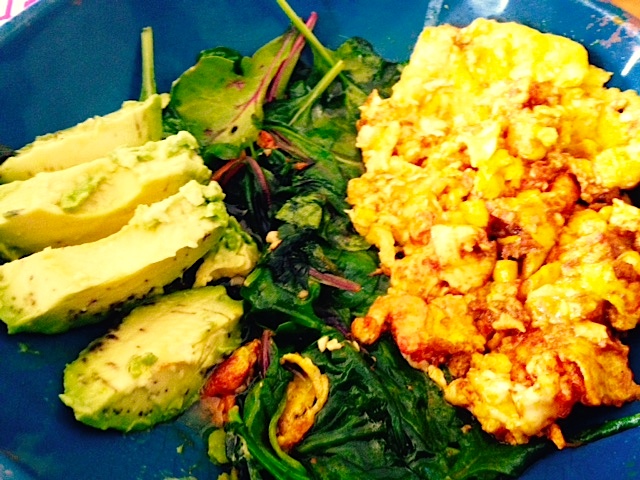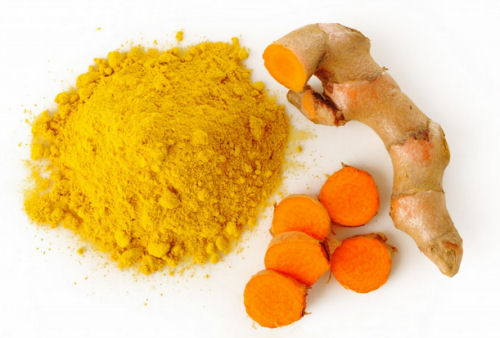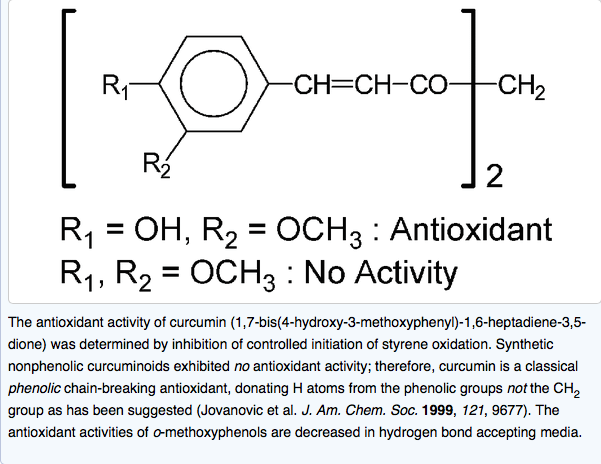Turmeric has quickly become one of my favorite spices to use in the kitchen, and it’s not just because of its cheerful color (it makes curry and mustard yellow) and earthy flavor that hints of mustard and ginger. It has also been regarded as a versatile, medicinal herb in Indian Ayurvedic medicine for thousands of years. The major ingredient in turmeric, curcumin, has been demonstrated to have myriad health benefits, as a powerful anti-inflammatory and antioxidant. It’s also been shown to have a preventive effect against numerous diseases, including Alzheimer’s and cancer, and help alleviate other conditions.
1. Turmeric Fights Pain and Inflammation
Curcumin is a powerful anti-inflammatory, with implications for managing inflammatory diseases. After a review of 700 studies, James A. Duke, PhD, found that turmeric contains more than two dozen anti-inflammatory compounds, including six COX-2-inhibitiors, according to DrWell.com . Cyclo-oxygenase 2, or COX-2, is an enzyme that promotes inflammation, swelling and pain.
A small study of patients with rheumatoid arthritis (RA) found that curcumin was a safe and effective treatment for active disease. In fact, patients who took curcurmin in showed greater reduction of disease active scores and decreased tenderness and swelling of joints that patients taking the drug diclofenac sodium (Voltaren).
In another study, patients with knee osteoarthritis (OA) given turmeric extracts experienced a reduction in pain and improvement in joint function with the same efficacy as ibuprofen.
Other studies have shown that curcumin acts on the pro-inflammatory cytokine Interleukin 1beta, which is instrumental in inhibiting the production of collagen, thus mediating the degradation of cartilage in OA and RA. The herbal compound suppressed the destructive cellular changes caused by IL-1beta.
Curcumin also proved an effective, natural alternative to treating chronic anterior uveitis, inflammation of the middle layer of the eye. Curcumin supplementation lacked the considerable side effects of corticosteroid therapy, which was the only standard treatment for the disease at the time of the study.
Curcumin has also been shown in multiple studies to suppress transcription factor NF-κappaB, a molecule that plays a vital role in the immune system: controlling the expression of COX-2 and cytokines, which aid cell-to-cell communication in immune responses, stimulating movement of cells toward the sites of inflammation, infection and trauma. Dysregulation of NF-kB is linked to autoimmune and inflammatory diseases, such as RA, Crohn’s disease and ulcerative colitis.
A 2004 study published in Oncogene demonstrated that curcumin and resveratrol proved to be more anti-inflammatory than the non-steroidal anti-inflammatory drugs (NSAIDS) of aspirin, ibuprofen, naproxen, and indomethacin, and as effectively as celecoxib (Celebrex) and the corticosteroid dexamethasone.
2. Curcumin Attacks Cancer
According to the study above, curcumin (and resveratrol) also inhibited the proliferation of tumor cells, as effectively, if not more so, as the above drugs and tamoxifen (used to treat breast cancers). Previously, aspirin and other NSAIDs have been shown to suppress NF-kB, stopping the growth and spread of tumor cells. NF-kB regulates the expression of genes like cyclooxygenase (COX)-2 and cyclin D1. NF-kB signaling is implicated in cancers, such as such as leukemia, lymphoma, colon cancer, ovarian cancer and melanoma.
Turmeric has also been shown to enhance chemotherapy in fighting head and neck tumors, according to a 2010 University of California—Los Angeles study. While making tumors more sensitive to chemotherapy drugs, the concurrent use of curcumin might also protect organs of the body from the toxic effects of chemo.
Curcumin has been shown to help stop the promotion and progression stages of colon and pancreatic cancer that are chemically induced.
A University of Illinois at Chicago study also gives promise that curcumin might help to prevent further spread of colorectal tumor growth. A study of male smokers with colon lesions found that 4g of curcumin for 30 days reduced the number of ACF, abnormal tube-like glands in the lining of the colon and rectum that occasionally progress to cancer, by 40 percent.
3. Turmeric Promotes Heart Health
Studies have also shown that turmeric is good for the heart, promoting healthy endothelial function. The endothelium, or inner lining of blood vessels, regulates blood pressure, blood clotting and immune function. It maintains proper blood flow and regulates the diameter and tone of a blood vessel when fully dilated, which is vital to the health of arteries. Endothelial dysfunction can lead to high blood pressure and cardiovascular diseases like coronary artery disease. Likely due to its antioxidant and anti-inflammatory properties, curcumin improves endothelial function, thus lowering the risk of heart disease.
In a 2012 study of postmenopausal women, consumption of curcumin improved vascular endothelial function—increasing blood flow and vessel dilation—just as well as moderate aerobic exercise. Also in 2012, a study reported findings that supplementation of 4 grams daily of curcumin cut the chance of heart attack in bypass patients after surgery by 65 percent . During bypass surgery the heart muscle can be damaged by extended restriction of blood flow, increasing the patient’s risk of heart attack.
4. Curcumin Might Prevent Diabetes
A 2012 study published in the American Diabetes Association’s journal Diabetes Care found that nine months of supplemental with curcumin pills dramatically decreased the number of prediabetic subjects who went on to develop type 2 diabetes.
The researchers found that the anti-inflammatory properties of curcumin appeared to improve the function of beta cells in the pancreas, which store and release insulin, the hormone that regulates blood sugar.
5. Turmeric Is Neuroprotective
The antioxidant and anti-inflammatory properties of curcumin have also been shown to improve cognitive function in patients with neurodegenerative diseases, like Alzheimer’s.
Alzheimer’s disrupts the electrical activity of the brain and leads to tissue loss and the death of the brain’s nerve cells, or neurons, which affects the signaling for memories, thoughts and feelings. In Alzheimer’s abnormal clusters of protein fragments, called beta-amyloid plaques, build up between the nerve cells, and often block the signaling across synapses from one neuron to another. Plaques may also trigger immune cells to inflame and destroy disabled cells.
“Curcumin has a demonstrated ability to enter the brain, bind and destroy the beta-amyloid plaques present in Alzheimer’s with reduced toxicity,” Wellington Pham, Ph.D., senior author of a study from Vanderbilt University published earlier this year, said, according to Research News @ Vanderbilt .
Evidence suggests that Alzheimer’s is also partly caused by free radicals that form from oxidative damage and cause oxidative stress, bio-metal toxicity and abnormal inflammation. Curcumin has been demonstrated to reduce plaques and microglia formation, delay the destruction of neurons, chelate metals and, again, serve as a general anti-inflammatory and antioxidant, improving overall memory in patients.
A free radical is a damaged, electron-deficient cell that can kill other cells to repair itself or harm other cells that may mutate and abnormally grow. Antioxidants neutralize free radicals, preventing damage to proteins and DNA, which is thought to cause numerous health problems, including neurodegenerative diseases. Studies have shown that curcumin is a powerful antioxidant that interacts with and suppresses free radicals and modulates levels of a vital antioxidant called glutathione, which along with curcumin, is protective against oxidative stress, free radicals and metal toxicity, also thought to play a role in the development of diseases like Alzheimer’s.
Another compound in turmeric, aromatic turmerone (ar-turmerone), inhibits microglia activation, which might help treat neurodegenerative disease. Microglia are cells in the brain and spinal chord that act as the immune defense system of the central nervous system, specifically looking for plaques and damaged cells. Microglia activation is a major sign of inflammation in the brain and is associated with various neurologic disorders, including neurodegenerative diseases like Alzheimer’s. Ar-turmerone has been demonstrated to boost the growth and spread of targeted neural stem cells, which can then repair and recover brain function .
CONCLUSION ON CURCUMIN
 Turmeric, known colloquially as “the blood thinner,” has been shown to protect your heart and brain, fight inflammation and help slow aging and disease. It might also have benefits for mental health by alleviate depression. The more I learn about it, the greater reason I see to add turmeric to your daily diet.
Turmeric, known colloquially as “the blood thinner,” has been shown to protect your heart and brain, fight inflammation and help slow aging and disease. It might also have benefits for mental health by alleviate depression. The more I learn about it, the greater reason I see to add turmeric to your daily diet.
While by itself, turmeric has a rather bitter taste, it blends smoothly with other ingredients to please the palate. I personally add about a tablespoon to my breakfast in eggs, which are slow scrambled in butter. Add avocado to the mix for a tasty, creamy combo!
Find out three simple tricks to optimize the therapeutic potency of turmeric in the body here.



Very informative piece about turmeric and the health benefits it brings to recipes. I’ll have to find a way to incorporate more of it since it impacts so many processes
Thanks so much! Glad you learned from the piece. I love finding new ways to incorporate turmeric in meals. If you find a great recipe, please share!
It definitely has so many great health benefits. I just saw a new recipe for cold turmeric and ginger drink that will be perfect for summer. I’ll have to share the recipe if I love it.
Really nice article, Thanks
Thanks for reading and commenting, Robby!
Thank you for this informative article.
Can it be combined with the blood thinner clopidogrel? And if so can one add resveratrol as well? If not would it be a better strategy to take aspirin rather than clopidogrel so that one can add turmeric and resveratrol? Or just rely on the blood thinning qualities of resveratrol and turmeric?
Hi Arie, because Turmeric acts as a blood thinner, it is very strongly advised not to take it in combination with other blood thinners, like Plavix (clopidogrel), Coumadin or Heparin, as well as aspirin. Turmeric actually boosts the effect of the blood-thinning drugs and thus raises the risk of bleeding. http://www.healthyfoodhouse.com/dont-ever-use-turmeric-if-youre-on-any-of-the-following-medications Resveratrol may also pose similar risk for the same reasons. Resveratrol is considered a popular natural alternative to aspirin because it purportedly not only thins the blood and inhibits clots the way that aspirin can, but it also may have “anti-adhesion” factors that stop plaque from sticking to artery walls, which would be good news for your cardiovascular health.